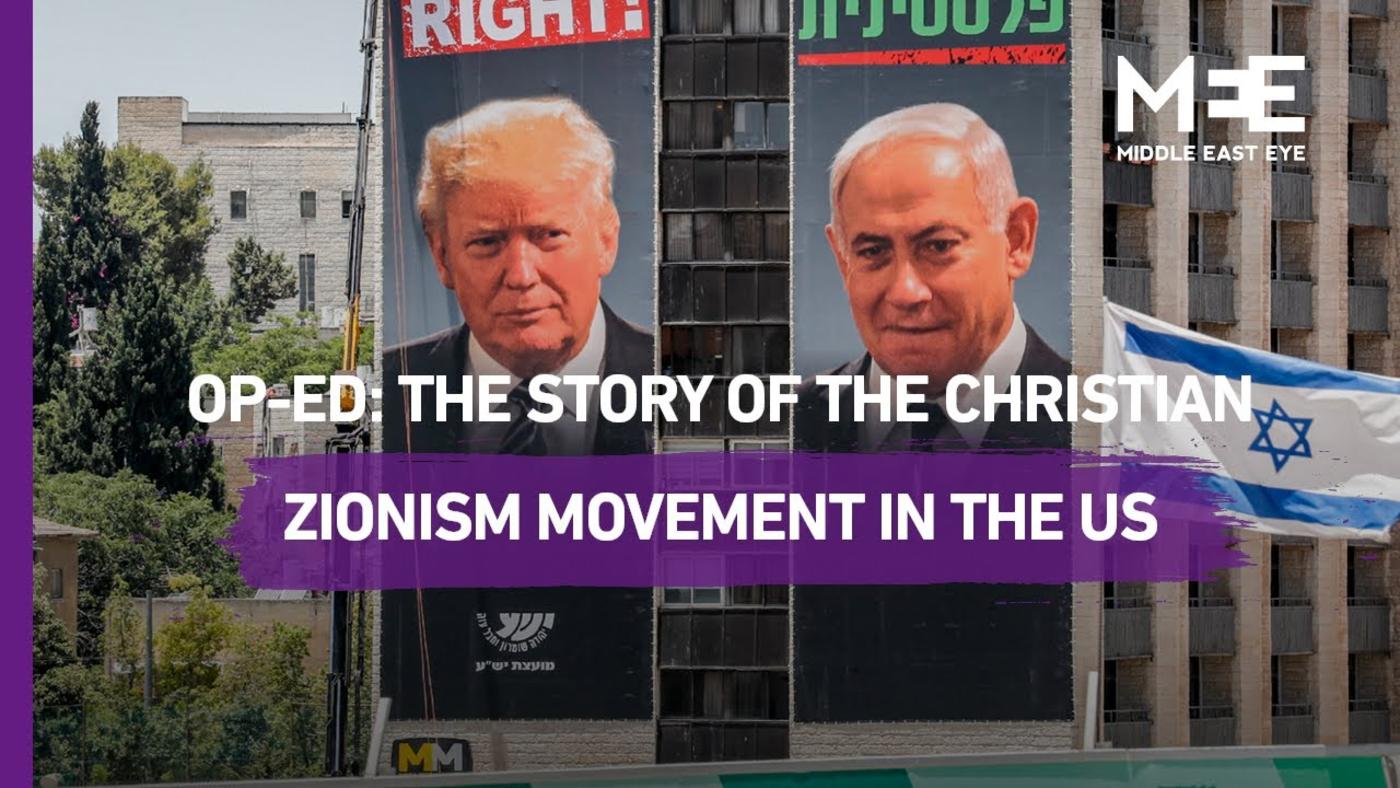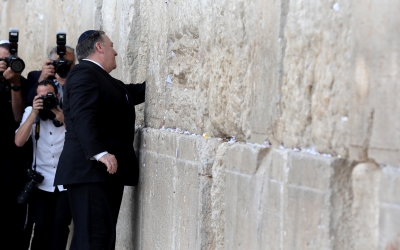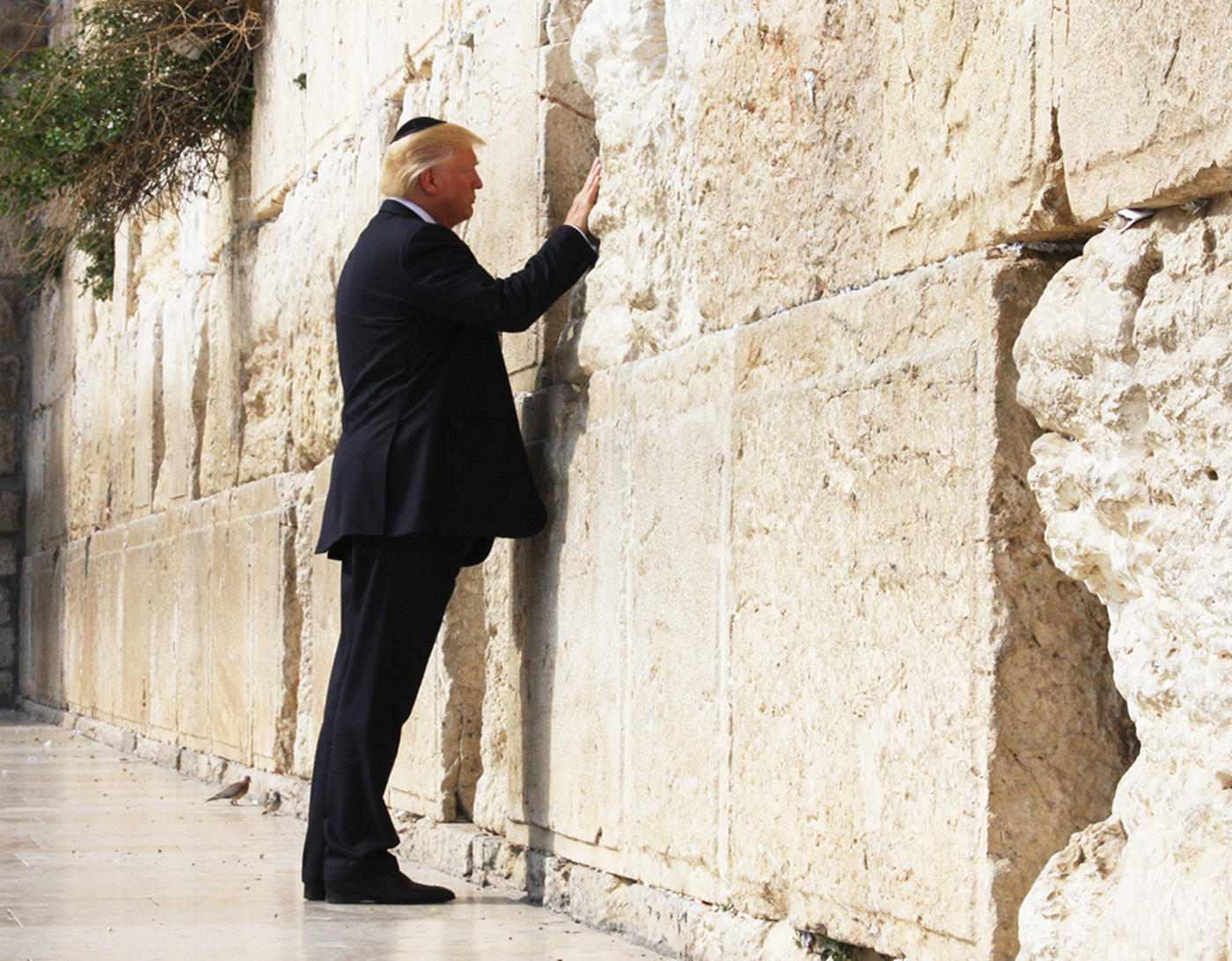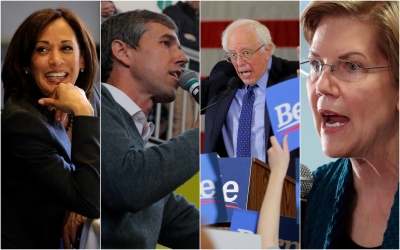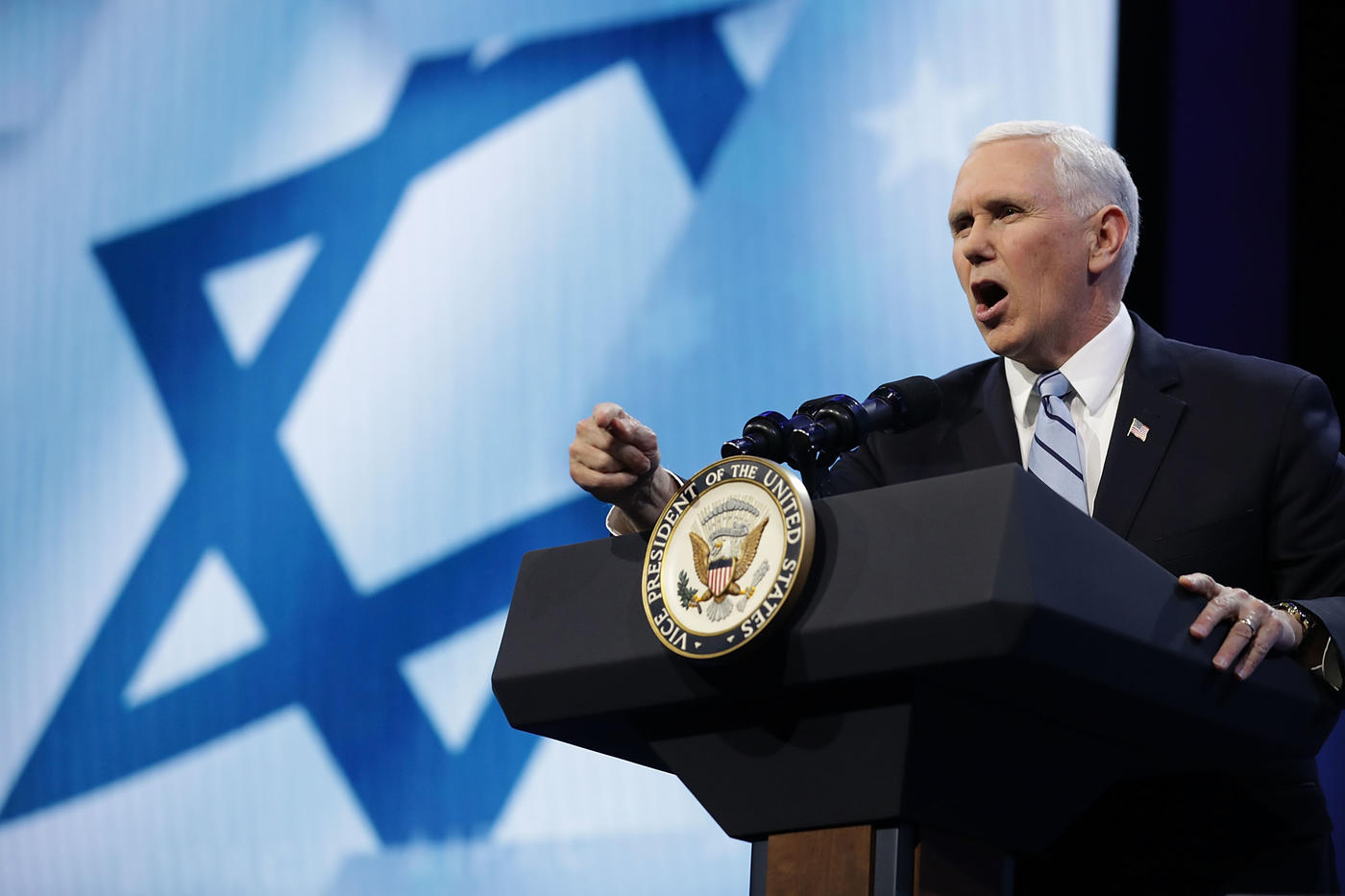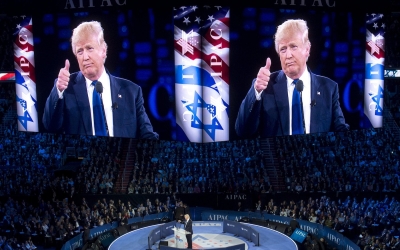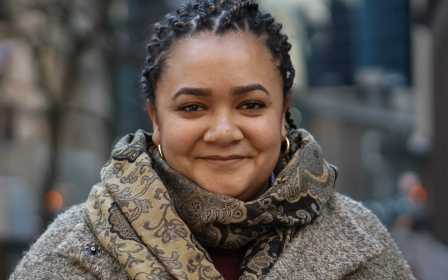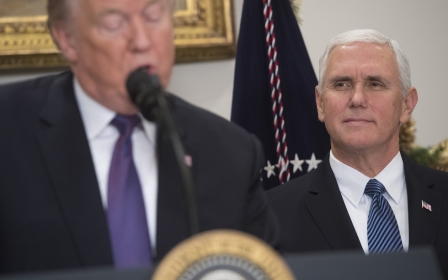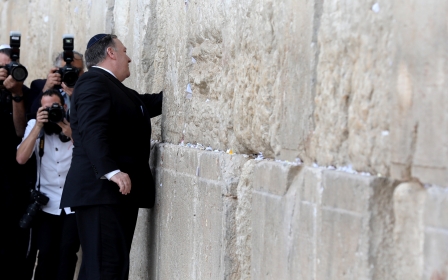'Tip of the spear': The US Christian movement praying for Trump and Israel
In the United States, criticising Israel often comes at a cost.
In the case of Congresswoman Ilhan Omar, a black Muslim and former refugee, the price came in the form of death threats, online abuse, and attempts to have her removed from office.
In early March, Omar inferred in a conversation on Twitter that the American Israel Public Affairs Committee (AIPAC), a pro-Israel lobby group, used money to influence the US government’s close ties with Israel.

The comments prompted a furious reaction in which Omar, a first-term Democrat from Minneapolis, was called an anti-Semite whose criticism of Israel was a slight at Jewishness itself.
Following a statement from the Democratic leadership accusing her of using “anti-Semitic tropes”, Omar said she apologised unequivocally, while reaffirming her point that lobbyists, including AIPAC, played a “problematic role… in our politics”.
Though there were Jewish Americans who said they were hurt by Omar’s assertions, others from the community came to her defence, arguing that the attack was a deliberate ploy to deflect from the real discussion: the US government’s support for Israel’s occupation of Palestinian lands.
Those who defended Omar said that AIPAC and other pro-Israel groups had "weaponised anti-Semitism" to literally quash criticism of Israel.
Indeed, some saw the backlash which followed her call-out of AIPAC as only serving to emphasise her point.
“AIPAC uses its power to urge senators and congressmen who may have agreed with Omar about the influence of the lobby, to pounce on and condemn her,” Jonathan Kuttab, a human rights lawyer based between Jerusalem and Washington DC, told Middle East Eye.
But other commentators rushed to puncture Omar’s intimation that “AIPAC money” was the driving factor behind the US government’s support of Israel.
They argued that religious or ideological symmetry may be as applicable, or even more responsible for America’s pro-Israel bias, unwittingly drawing attention to the other powerful backer of Israel in the US.
“When criticism is levelled against those lobbying in support of Israel or its policies, people immediately assume it is a reference to Jews - despite the fact that much of the lobbying on Israel today, perhaps more than what comes from AIPAC and other Jewish groups, comes from Christian Zionists and their ilk,” Lara Friedman, President of the DC-based Foundation for Middle East Peace, told MEE.
Kuttab agrees: “And when they came after Omar, it was not only AIPAC but the Christian Zionist lobby [too].”
Christian Zionists and Donald Trump
White evangelical Christians make up 76 percent of the overall evangelical population in the US, which itself is a quarter of the American electorate.
According to a Public Religion Research Institute (PRRI) poll conducted in late 2018, President Donald Trump enjoys an approval rating of 71 percent among white evangelicals.
It is this demographic that remains among the most conservative with regards to immigration, demographic change, and climate change.
“These would be people who interpret the Bible almost literally,” said Donald Wagner, a professor of religion and Middle Eastern Studies at North Park University in Chicago.
There is no hard data, but some scholars, like Wagner, estimate that about 15 to 18 percent of US evangelicals are fundamentalist Christian Zionists.
Followers of Christian Zionism believe that the modern state of Israel is a manifestation of prophecies found in the Bible; the fate of the United States is by implication linked to that of Israel.
“This is Trump’s base,” said Wagner, himself a former Christian Zionist.
Senior members of Trump’s administration, including Vice President Mike Pence and Secretary of State Mike Pompeo, have made no secret of their evangelical beliefs.
But when it comes to the matter of Israel, the role of the Christian right is not as prominent in the national imagination.
“Christian Zionism is hardly discussed. In most analyses of US policy, it is given lip service but is not deeply investigated. I see it as part of a bigger problem of underestimating radical conservatism in the USA,” Jonathan Brenneman, a Palestinian-American Christian working with the Mennonite Church USA, said.
“The pro-Israel bias of the US Congress, especially on the Republican side, is more due to Christian Zionism among evangelicals than it has to do with appealing to the Jewish community in the US. This is most clear in President Trump's policies,” he told MEE.
The influence of the Christian Zionist lobby in US politics is not new.
Joze Pelayo, a researcher in foreign policy based in DC, wrote in a 2018 essay in the Palestine-Israel Journal of Politics, Economics, and Culture: “Partisan politics in favour of Israel date back to [former US president] Ronald Reagan, who brought the Christian-Zionist alliance to the centre of the Republican Party.
“And unfortunately, after 9/11, this alliance solidified, helping them to align themselves even more based on their ‘fear’ of Muslims.”
Wagner says that the politics of President George W Bush and the war in Iraq, the "war on terror" and now Iran, all fall within the ambit of this “fear-based narrative”. And much of it is in the public domain.
Interviewed in Jerusalem on Thursday by the Christian Broadcasting Network (CBN), Pompeo agreed with a presenter who suggested that Trump may have been sent by God to “save the Jewish people from the Iranian menace” and compared him with Queen Esther, who, according to the biblical story, saved the Jews from being massacred in the ancient Persian empire.
“Could it be that President Trump is being raised for such a time as this, just like Queen Esther?” the presenter asked.
“As a Christian, I certainly believe that’s possible,” replied Pompeo.
Though white evangelical support for Israel has traditionally influenced both Democratic and Republican parties, a growing uneasiness with the alliance between Trump and an increasingly right-wing Israeli government is leading to tough questions of leaders from the Democratic Party, many of whom have withdrawn from AIPAC’s policy conference, which starts on Sunday.
Reverend Mae E Cannon, executive director of Churches for Middle East Peace based in Washington DC, told MEE that some Christian fundamentalists are growing increasingly entrenched in their ideas because they feel “threatened”.
“We are seeing an increase in anti-Semitism, a rise in hate crimes as a result,” Cannon said.
Likewise, Wagner says that the recent massacre of 50 people at two mosques in New Zealand “demonstrates the severity of this issue".
“Many of these [white supremacists] are coming out of these right-wing Christian narratives,” Wagner said.
Brenneman agrees: “At its core, it is an extremist ideology, but it is so widely held in the US, and so bizarre to those who aren't part of it, that Christian Zionist beliefs are largely overlooked.”
While AIPAC may be synonymous with the pro-Israeli lobby in the US, it is certainly not the only one.
Millions-strong movement
A vast cauldron of lobby groups, pushing a variety of objectives, from liberal Zionist to extreme right, continue to operate at the behest of Israeli interests.
But whereas AIPAC wields tremendous power, drawing politicians from Barack Obama and Hillary Clinton to address their annual summits, the organisation pales in comparison with the immense size of Christians United for Israel (CUFI).
While AIPAC is said to have 100,000 members, CUFI says it has over five million and describes itself as the largest pro-Israel organisation in the United States.
It also claims to be the only Christian organisation working to transform millions of “pro-Israel Christians into an educated, empowered, and effective force for Israel”.
The organisation, founded in 2006 by John Hagee, says it has played a leading role “in efforts to curb Iran’s nuclear ambitions, hinder Hezbollah and Hamas’ war of terror against Israel, strengthen the Jewish state’s ability to defend itself, and defend Israel against the anti-Semitic BDS [Boycott, Divestment and Sanctions] movement”.
Nikki Haley, the former US ambassador to the UN, described CUFI as the “tip of the spear” in the fight against worldwide anti-Israel sentiment.
It is this group that pushed for the US to drop aid to the Palestinians and endorsed Trump’s decision to move the US embassy from Tel Aviv to Jerusalem.
CUFI has also backed anti-boycott legislation, in reference to the BDS campaign, that has been enacted in 26 states.
“AIPAC uses the power and numbers and the money of the evangelical Christian Zionists to enforce their position,” Kuttab said.
Though it is understood that AIPAC and CUFI work with each other, it is not clear the extent to which they collaborate. But notable Christian evangelicals are known to speak at AIPAC’s policy conference.
“It is possible CUFI overstates its size and scale of activity, but I think it would be fair to say there are more Christian fundamentalists in this country than there are Jews in this country that are supporting AIPAC,” Wagner said.
“Now you even have younger Jews who don’t support AIPAC.”
Neither AIPAC nor CUFI replied to multiple requests from MEE for comment.
Confronting Christian Zionism
Samantha Brotman, membership manager of Jewish Voice for Peace (JVP), the Jewish-American organisation that works against bigotry and for an end to the Israeli occupation of Palestinian lands, says that progressive Jewish organisations have not adequately tackled the influence of Christian Zionism.
“We need to be paying a lot more attention to Christian Zionism because a lot of our work, and rightly so, focuses on building an alternative Jewish community, and an alternative Jewish future beyond Zionism,” Brotman told MEE.
“But I do think we also need to focus on challenging the movements and ideologies standing in the way of Palestinian freedom.”
The Philadelphia-based Brotman said that while the JVP had always understood that Christian Zionism “was out there”, for “one reason or another, it hasn’t been a focus of ours... maybe it was the timing”.
But this is changing. JVP recently held an education webinar on Christian Zionism and Brotman says interest for the topic was off the scale.
“Around 1,000 people registered for the webinar, making it the most successful webinar we’ve ever had… people are hungry to understand what is going on.
“Speaking in my personal capacity, I feel it’s a major part of the puzzle as to why the US is so strongly in support of Israel, and why we spend so much money on Israel every year and why politicians feel they need to kowtow to Israeli talking points. If we only focus on AIPAC or other Jewish organisations, we are missing something.”
Just as JVP is looking to educate its Jewish members on Christian Zionism, there are a number of projects and organisations looking for ways to persuade American leaders and evangelicals to change their approach towards Israel and the Palestinians.
'They meet Palestinian Christians. They see the reality of a military occupation. We don’t have to do a lot of work to convince them once we show them'
- Mae E. Cannon, Churches for Middle East Peace
Cannon, executive director of Churches for Middle East Peace, says that her organisation routinely takes evangelical Christians to Israel and the occupied territories to “show them the reality”.
“They meet Palestinian Christians. They see the settlements. They see the reality of a military occupation. We don’t have to do a lot of work to convince them once we show them,” Cannon said.
A 2014 profile of a non-profit called Telos describes its work as a “quiet effort aimed at pushing evangelical Christians away from decades of growing loyalty to Israel and toward increased solidarity with the Palestinians”.
Telos is said to operate behind the scenes, meeting with politicians and lawmakers and organising alternate trips to Israel and the occupied-West Bank.
Telos did not reply to MEE’s request for comment or elaboration on their work.
Turning the tide
In his address at a gathering organised by the Washington Report on Middle Affairs in 2018, Thomas Getman, advisory board member of Friends of Sabeel North America, an international peace movement initiated by Palestinian Christians, said that “silence in the mainstream church has allowed Palestine to be defined by Zionists”.
“AIPAC is successful as an agent of minority Gentile sentiment, not just Jewish support. Sadly, the majority… We must stir them up. I propose it is bad for Israel, as well as America’s place in the free world. It’s destined for failure,” Getman said.
Wagner told MEE that older evangelicals still supported Israel unquestionably.
“They will say God gave the land to Israel. But younger evangelicals are somewhat sympathetic to Palestinians. The younger evangelicals are changing,” he said.
According to a poll by Lifeway Research in 2017, 58 percent of evangelicals aged between 18 and 34 support Israel, compared to 76 percent among the over-65s.
Among younger Christian evangelicals, discussion is said to be rife over the treatment of Palestinians, and the disproportionate Israeli military response to Palestinian resistance.
Writing in Relevant magazine, a publication geared for millennial Christians “seeking God and striving to impact the world around us”, Paul Corrigan, a teacher of writing and literature at Southeastern University in Lakeland, Florida, offers a treatise on a Christian response to the crisis in the Holy Land.
Corrigan implores the faithful to consider the humanity of Palestinians and “use our minds... and parse the situation more carefully”.
Brotman, from JVP, says she thinks that part of the problem is that a lot of Christian evangelicals are unlikely to have met many American Jews.
“They just assume they are standing with Jewish people and assuming that this is what the Jewish people want.
“I wonder, if they knew how many Jews are actually critical of Israel, and how many want Palestinian freedom, whether that might change their mind about the topic.”
Middle East Eye propose une couverture et une analyse indépendantes et incomparables du Moyen-Orient, de l’Afrique du Nord et d’autres régions du monde. Pour en savoir plus sur la reprise de ce contenu et les frais qui s’appliquent, veuillez remplir ce formulaire [en anglais]. Pour en savoir plus sur MEE, cliquez ici [en anglais].


